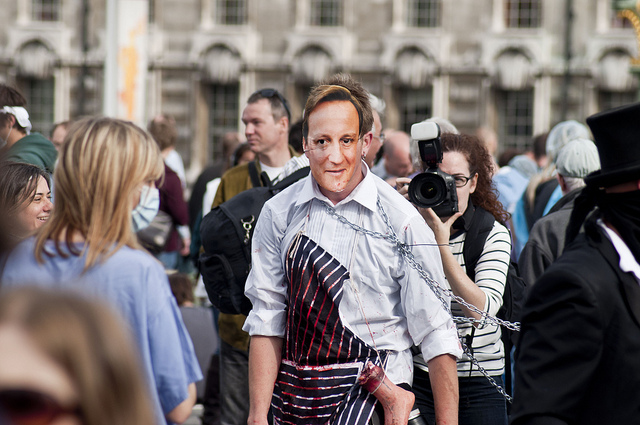Expectation management: can politicians win back political trust by limiting what the public expects of them?
Politicians may be feverishly campaigning for votes, but fewer and fewer citizens say they trust them and the institutions they inhabit. In this post, Ben Seyd considers what politicians can do to strengthen the public’s confidence in their work. He suggests that trust may not be responsive to the expectations that people have of politicians; instead, trust seems more affected by perceptions of how well politicians are seen to perform. Boosting the public’s trust might therefore require improving political performance rather than simply limiting what the public expects of its elected representatives.

Credit: Megan Trace, CC BY NC 2.0
Everyone is focusing right now on the parties’ election fortunes, and who will take power after 7th May. But look beyond people’s electoral choices to their views on politicians and political institutions, and the results are not pretty. The latest figures from the British Social Attitudes survey show that fully one third (32 per cent) of the British population profess to ‘almost never’ trusting government, three times the level recorded in 1986. Over the same period, the proportion of citizens saying they trust government ‘just about always’ or ‘most of the time’ has halved, from 38 per cent to 17 per cent. This weakening of political trust is of concern to politicians, who understandably feel uncomfortable faced with such a harsh public judgement. But low trust in politicians and political institutions also has wider, and more serious, effects. We know from recent research, for instance, that people who distrust government are twice as likely as those who trust government to accept law-breaking behaviour such as tax and benefit fraud. Low trust is thus detrimental to effective government.
The causes of low political trust are complex, and have been touched on in previous Audit blogs, such as here and here. But what about solutions? Might one road to greater trust lie in politicians limiting what the public expects of them? After all, two people might form very different views on an object (a specific object such as a shopping purchase, or a broader set of actors like politicians) depending not only on the quality or performance of that object, but also on what quality or performance was expected. Indeed, research suggests that people’s satisfaction with government is shaped by perceptions of how well government performs relative to what is expected of it. If this line of research – most of which has been conducted in the US – is correct, then politicians in the UK concerned by low levels of trust might wish to dampen down claims about what they will achieve in the hopes of limiting what the public expects of them.
However, in research just published, I cast doubt on whether expectations are quite as significant in shaping levels of political trust. The research draws on a survey which asked British citizens about various standards of behaviour among politicians, such as owning up to mistakes, spending public money wisely and setting a good example in their private lives. Asked how important each of these behaviours was, the public not surprisingly deemed all of them to be important (although less so in the case of politicians’ private lives). Then asked how many politicians actually meet these standards, the public’s judgement is often far more negative. So expectations are high, and performance is often seen to fall short of the desired standards. No surprises yet.
The key test, though, was to see how far political trust is responsive to assessments of politicians’ performance alone, or rather to assessments of performance relative to people’s expectations. Here, in a variety of tests, a consistent picture emerged: while expectations matter for trust, what matters even more are people’s perceptions of performance (in this case, standards of political conduct). Even when we focus on people who hold very different expectations of politicians – those who judge the behaviour to be very important as opposed to less important – we find that assessments of performance have a greater effect on political trust than expectations. The research suggests that people’s trust in politicians appears primarily to reflect how well they judge those politicians to have performed, rather than how that performance relates to prior expectations.
This is not to suggest that expectations do not matter for the way people view politicians and political institutions. They clearly do. But they may matter rather less than perceptions of what politicians have actually done or what they have actually delivered. Politicians concerned to boost their public image may therefore find that managing public expectations – by limiting what voters expect of them – may have rather little impact on levels of trust. Not that politicians, faced with a tight election, show any sign of offering more cautious and realistic promises, anyway.
—
Note: this post represents the views of the author, and not those of Democratic Audit or the LSE. Please read our comments policy before posting.
—
Dr Ben Seyd teaches politics at the University of Kent. He is currently writing a book about political trust. The research paper on which this post is based is freely available for download here.






 Democratic Audit's core funding is provided by the Joseph Rowntree Charitable Trust. Additional funding is provided by the London School of Economics.
Democratic Audit's core funding is provided by the Joseph Rowntree Charitable Trust. Additional funding is provided by the London School of Economics.
Los políticos pueden recuperar confianza haciendo bien la pega más que bajando expectativas, dice estudio en UK:
https://t.co/u9ynuAbjXs
Expectation management: can politicians win back political trust by limiting what the public expects of them? https://t.co/gOThdunbUr
Expectation management: can politicians win back political trust by limiting what the public expects of them? https://t.co/3D0EYSgEwF #Opt…
Expectation management: can politicians win back political trust by limiting what the public expects of them? https://t.co/I7vIBPv0ZM